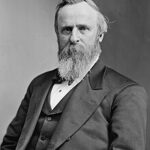The Spoils System Crisis
President Rutherford B. Hayes inherited a federal government plagued by political corruption. The spoils system dominated government hiring practices since Andrew Jackson’s presidency. Political loyalty mattered more than qualifications for federal positions. Hayes recognized this system undermined government effectiveness and public trust.
Hayes’ Merit-Based Approach
Hayes boldly challenged established practices by appointing qualified candidates regardless of party affiliation. ⚖️ He prioritized competence over political connections in federal appointments. The president supported competitive examinations for government positions. His civil service reform efforts faced fierce resistance from his own Republican Party. Many politicians depended on patronage jobs to reward supporters and maintain power.
The Reform Implementation
Hayes issued executive orders restricting political activities by federal employees. 📊 He prohibited assessments on government workers for political campaigns. The president appointed reformers like Carl Schurz to key cabinet positions. These leaders shared Hayes’ vision for professional government service. 💰 The reforms aimed to reduce corruption and improve government efficiency through qualified personnel.
Impact:
Immediate Political Consequences
Hayes’ civil service reform created significant political upheaval within the Republican Party. 🔥 Party leaders accused him of betraying loyal supporters and weakening party organization. The president lost considerable political capital fighting entrenched interests. Many Republicans refused to support his legislative agenda. However, Hayes maintained his commitment to reform despite fierce opposition from party bosses.
Foundation for Future Legislation
Hayes’ efforts laid crucial groundwork for the landmark Pendleton Civil Service Act of 1883. His presidency demonstrated the practical benefits of merit-based appointments. 📈 Government departments with qualified employees showed improved performance and reduced corruption. The reform movement gained momentum during Hayes’ term. Public opinion increasingly supported professional government service over political patronage.
Long-term Transformation
Hayes’ civil service reform fundamentally transformed American government employment practices. 🌍 His initiatives established principles that guide federal hiring today. The merit system became the standard for government positions across all levels. Modern civil service protections trace their origins to Hayes’ pioneering efforts. His reforms created a professional bureaucracy capable of serving changing national needs effectively.
